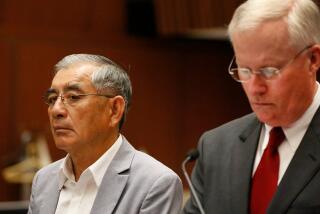Pro-Israel Lobbying Group Accused of PAC Violations
- Share via
WASHINGTON — The nation’s chief pro-Israel lobbying group was accused Thursday of widespread election-law violations in a complaint filed by former U.S. officials associated with the American Arab Anti-Discrimination Committee.
In requesting an investigation by the Federal Election Commission, former Undersecretary of State George Ball, former Rep. Paul Findley (R-Ill.) and others charged that the American Israel Public Affairs Committee illegally helped numerous pro-Israel political action committees make excessive contributions to congressional candidates in 1984, 1986 and 1988.
Despite its initials, AIPAC is not registered as a money-giving PAC and maintains that it does not endorse candidates or help funnel money to campaigns. However, the 174-page complaint cites internal memos and the presence of AIPAC officers on many pro-Israel political action committees as evidence that AIPAC coordinates donations made by the PACs, action that would violate the law.
The complaint, filed to support the interests of the frequently divided and disorganized American Arab community, represents one of the most significant challenges yet to the power of AIPAC. AIPAC’s lobbying for aid to Israel--and against aid to her enemies--is widely considered the most effective in Washington.
The action could prompt an examination of AIPAC’s activities.
Abdeen Jabara, president of the American Arab Anti-Discrimination Committee, said that it is “the fervent desire” of his 23,000-member organization to “trigger a full and thorough investigation of AIPAC’s role in the American political process.”
In a brief statement, AIPAC scoffed at the allegations and said that the 174-page complaint is “based almost exclusively upon press clippings and supposed quotations.” The group said that it is confident an FEC investigation would find its actions lawful.
An FEC official, who declined to be identified, predicted that the six-member commission would agree to an investigation.
Inquiries into similar allegations in other cases led to modest civil fines against the American Medical Assn. and a group associated with Sen. Jesse Helms (R-N.C.), the official said. He speculated that, if adverse action were taken against AIPAC, the practical effect on campaign contributions by pro-Israel groups would be slight.
“These things usually result in a book-keeping shuffle, with the money being merely shifted around and sent by a different route,” he said. “However, in this case, it might force AIPAC to be more visible.”
The complaint follows the recent indictment of Los Angeles businessman Michael R. Goland, a pro-Israel activist. Goland is charged with illegally funneling campaign contributions to benefit the 1986 campaign of Sen. Alan Cranston (D-Calif.), a strong supporter of Israel.
Goland, who once was associated with AIPAC and has had ties with Washington PAC, a pro-Israel group, also was fined by the FEC for failing to identify himself as the sponsor of television ads in 1984 that were critical of former Sen. Charles H. Percy (R-Ill.)--not one of Israel’s staunchest supporters.
Others Sign Complaint
Besides Ball and Findley, signers of the complaint against AIPAC included Retired Rear Adm. Robert Hanks, former commander of the U.S. fleet stationed in the Persian Gulf; James E. Aikens, former U.S. ambassador to Saudi Arabia; Andrew I. Killgore, former U.S. ambassador to Qatar; Richard Curtiss, a former U.S. Information Agency official who is now editor of the Washington Report on Middle East Affairs, and Orin Parker, president of Amideast, a U.S. educational and development organization operating in the Middle East.
Killgore said in a statement that “congressmen and senators are terrified to oppose the wishes of AIPAC, as almost any of them privately affirm. The very welfare of the United States depends on exposing the machinations of AIPAC, which takes its direction from the state of Israel, not from America.”
More to Read
Get the L.A. Times Politics newsletter
Deeply reported insights into legislation, politics and policy from Sacramento, Washington and beyond. In your inbox three times per week.
You may occasionally receive promotional content from the Los Angeles Times.










